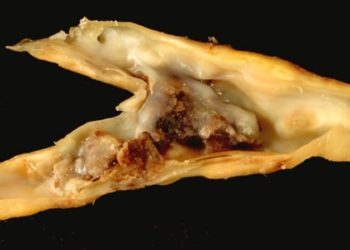#VisualAbstract: Evolocumab successfully reduced LDL levels in pediatric patients
1. Evolocumab successfully reduced low density lipoprotein (LDL) cholesterol levels in pediatric patients with heterozygous familial hypercholesterolemia.
2. Non- high density lipoprotein and apolipoprotein B levels were also improved in the evolocumab group.
Evidence Rating Level: 1 (Excellent)
Study Rundown: In the adult patient population with hyperlipidemia, human monoclonal antibodies that inhibitor PCSK9, namely evolocumab has been shown to successfully reduce lipoprotein (LDL) cholesterol levels. However, little is known about the effects of this drug in the pediatric population. This study examined the efficacy and safety of evolocumab in children with familial hypercholesterolemia. The results were promising, revealing evolocumab effectively reduced LDL cholesterol levels when compared to the placebo. In fact, when the secondary lipid variables such as non-high density lipoprotein (HDL) and apolipoprotein B were measured, evolocumab displayed significantly better results when compared to the placebo. The study was limited by several factors. Firstly, the patient population was predominantly white. Secondly, the study was conducted for a short duration of time and therefore certain assessments could not be extrapolated upon. Similarly, long-term efficacy and safety could not be evaluated in this study. Nevertheless, this study was strengthened by its multinational population with participants form North American countries, as well as in Latin America, Asia-Pacific and European regions.
Click to read the study in NEJM
Relevant Reading: Familial hypercholesterolaemia
In-Depth [randomized controlled trial]: This study was conducted over the span of three years, between March 2016 to November 2019, across 47 sites covering a total of 23 countries over five continents. In order for patients to be eligible for the study, a diagnosis of heterozygous familial hypercholesterolemia was required. Patients were selected if they were between 10 and 17 years of age prior to screening, with LDL cholesterol levels of 130mg per deciliter or greater and a triglyceride level of 400 mg per deciliter or less and had been on a lipid-lowering treatment for a minimum of 4 weeks. The screening period (maximum of 8 weeks) was followed by a 24-week double-blind treatment phase where the participant was randomly assigned in a 2:1 ratio to be administered one of the two treatment options, either monthly subcutaneous injections of evolocumab (420 mg) or the placebo for a total of 24 weeks. A total of 157 patients were recruited and randomized where 104 patients received evolocumab and 53 patients received a placebo. The mean age was 13.7+/-2.4 years where 85% of the participants were White among which 56% were female. The results indicated that the mean difference in the LDL cholesterol level at 24 weeks, when compared to the baseline, was -44.5% in the evolocumab group versus -6.2% in the placebo group. Overall, the study indicated that evolocumab effectively reduced LDL cholesterol levels in pediatric patients with heterozygous familial hypercholesterolemia.
©2020 2 Minute Medicine, Inc. All rights reserved. No works may be reproduced without expressed written consent from 2 Minute Medicine, Inc. Inquire about licensing here. No article should be construed as medical advice and is not intended as such by the authors or by 2 Minute Medicine, Inc.







